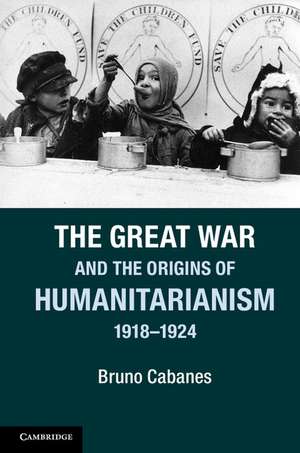The Great War and the Origins of Humanitarianism, 1918–1924: Studies in the Social and Cultural History of Modern Warfare
Autor Bruno Cabanesen Limba Engleză Paperback – 12 mar 2014
| Toate formatele și edițiile | Preț | Express |
|---|---|---|
| Paperback (1) | 274.88 lei 6-8 săpt. | |
| Cambridge University Press – 12 mar 2014 | 274.88 lei 6-8 săpt. | |
| Hardback (1) | 644.39 lei 6-8 săpt. | |
| Cambridge University Press – 12 mar 2014 | 644.39 lei 6-8 săpt. |
Din seria Studies in the Social and Cultural History of Modern Warfare
-
 Preț: 177.86 lei
Preț: 177.86 lei -
 Preț: 279.33 lei
Preț: 279.33 lei -
 Preț: 199.05 lei
Preț: 199.05 lei -
 Preț: 205.41 lei
Preț: 205.41 lei -
 Preț: 230.57 lei
Preț: 230.57 lei -
 Preț: 188.94 lei
Preț: 188.94 lei -
 Preț: 275.66 lei
Preț: 275.66 lei -
 Preț: 203.42 lei
Preț: 203.42 lei -
 Preț: 178.15 lei
Preț: 178.15 lei -
 Preț: 279.96 lei
Preț: 279.96 lei -
 Preț: 325.91 lei
Preț: 325.91 lei -
 Preț: 231.63 lei
Preț: 231.63 lei -
 Preț: 345.73 lei
Preț: 345.73 lei -
 Preț: 202.90 lei
Preț: 202.90 lei - 8%
 Preț: 530.54 lei
Preț: 530.54 lei -
 Preț: 200.34 lei
Preț: 200.34 lei -
 Preț: 156.72 lei
Preț: 156.72 lei -
 Preț: 232.44 lei
Preț: 232.44 lei -
 Preț: 313.34 lei
Preț: 313.34 lei - 9%
 Preț: 627.64 lei
Preț: 627.64 lei -
 Preț: 230.49 lei
Preț: 230.49 lei -
 Preț: 284.17 lei
Preț: 284.17 lei -
 Preț: 285.37 lei
Preț: 285.37 lei - 11%
 Preț: 699.86 lei
Preț: 699.86 lei - 11%
 Preț: 586.47 lei
Preț: 586.47 lei - 11%
 Preț: 587.49 lei
Preț: 587.49 lei -
 Preț: 222.33 lei
Preț: 222.33 lei -
 Preț: 287.28 lei
Preț: 287.28 lei - 11%
 Preț: 582.88 lei
Preț: 582.88 lei -
 Preț: 282.26 lei
Preț: 282.26 lei -
 Preț: 285.37 lei
Preț: 285.37 lei -
 Preț: 285.75 lei
Preț: 285.75 lei -
 Preț: 285.37 lei
Preț: 285.37 lei -
 Preț: 206.77 lei
Preț: 206.77 lei -
 Preț: 178.78 lei
Preț: 178.78 lei - 11%
 Preț: 642.35 lei
Preț: 642.35 lei
Preț: 274.88 lei
Nou
Puncte Express: 412
Preț estimativ în valută:
52.60€ • 55.06$ • 43.52£
52.60€ • 55.06$ • 43.52£
Carte tipărită la comandă
Livrare economică 05-19 aprilie
Preluare comenzi: 021 569.72.76
Specificații
ISBN-13: 9781107604834
ISBN-10: 1107604834
Pagini: 397
Dimensiuni: 153 x 229 x 22 mm
Greutate: 0.57 kg
Ediția:New.
Editura: Cambridge University Press
Colecția Cambridge University Press
Seria Studies in the Social and Cultural History of Modern Warfare
Locul publicării:New York, United States
ISBN-10: 1107604834
Pagini: 397
Dimensiuni: 153 x 229 x 22 mm
Greutate: 0.57 kg
Ediția:New.
Editura: Cambridge University Press
Colecția Cambridge University Press
Seria Studies in the Social and Cultural History of Modern Warfare
Locul publicării:New York, United States
Cuprins
Introduction: human disasters: humanitarian rights and the transnational turn in the wake of the First World War; 1. 'Rights, not charity': René Cassin and war victims; 2. Justice and peace: Albert Thomas, the ILO and the dream of a transnational politics of social rights; 3. The tragedy of being stateless: Fridtjof Nansen and the rights of refugees; 4. The hungry and the sick: Herbert Hoover, the Russian famine, and the professionalization of humanitarian aid; 5. Humanitarianism old and new: Eglantyne Jebb and children's rights; Conclusion: human dignity: from humanitarian rights to human rights; Bibliographical essay; Bibliography.
Recenzii
'We are accustomed to thinking about international law as the creature of realist geopolitics. Cabanes shows how international and transnational humanitarian activism helped build international law 'from below', in response to basic human needs. His book constitutes an important investigation of the long-run impact of the idealism rising out of the ashes of the Great War.' Leonard V. Smith, Oberlin College, Ohio
'Bruno Cabanes is well known in France as the inventor of a methodology for the study of the aftermath of war … The Great War and the Origins of Humanitarianism, 1918–1924 is a brilliant demonstration of the power of his method. It offers a terrifying panorama of the suffering of children, refugees, the starving and the homeless, from England to the Ukraine, whose fate was sealed paradoxically in 1919, by peacetime. But despair is only the beginning of the story. Cabanes focuses on five extraordinary men and women who were moved by these tragedies to fight for the right to human dignity, creating international organizations that are the true ancestors of today's NGOs … Readers of this compelling transnational history will come away with a whole new understanding of the ravages of the First World War, and with a very new picture of the 1920s.' Alice Kaplan, Yale University, Connecticut
'Between exceptional individuals and collective catastrophe, Bruno Cabanes teaches us with masterful authority how a new humanitarian front was born from total war.' Annette Becker, Paris West University Nanterre and Institut Universitaire de France
'Cabanes persuasively argues that the First World War was a key moment in the history of humanitarianism. By focusing his story on five extraordinary individuals, he has produced a history which is both comprehensive and highly readable. Stunning in its geographical and thematic breadth, The Great War and the Origins of Humanitarianism, 1918–1924 is nevertheless never pretentious or showy. The emphasis here is firmly - and movingly - on the power of human dignity. An unflagging desire for human justice is at the core of this story, but also, failure, conflict and exhaustion. This inventive, richly textured book will change the way we think about the history of human rights.' Mary Louise Roberts, University of Wisconsin, Madison
'The sheer scale of the refugee story, of statelessness, of what Cabanes calls the 'collective loss of nationality', of famine and mass suffering and death, makes for riveting and disturbing reading, but also the kind of scholarship that one steps back from in admiration. Wars do not necessarily end when guns are muzzled or with treaties signed in ornate rooms. This is the great subject of Cabanes' work. And we in other fields can learn so much from it.' David Blight, Yale University, Connecticut
'Amid the multitude of new books on WWI, Cabanes offers an original, substantive study by bringing together the cultural histories of the conflict and of human rights, drawing on a wide range of primary and secondary sources, many in French. He argues that the war and the troubled transition to peace in the years 1918–24 created an environment in which individuals and the transnational organizations they led provided much material aid and justice to millions of war victims not only because of humanitarian concerns but also because of their rights as human beings. Summing up: highly recommended.' A. H. Plunkett, Choice
'Humanitarians in the 1920s had not yet developed the bureaucracy or resources that they would acquire after World War II. But the fact that these humanitarian efforts did not, in the end, secure a lasting peace is no reason to diminish their aspirations, their vision, or their extensive work. Cabanes has done them justice in excavating their unique role in the history of humanitarianism, and he has presented scholars of humanitarianism with a compelling model for future work.' Rachel Chrastil, The Journal of Modern History
'Bruno Cabanes is well known in France as the inventor of a methodology for the study of the aftermath of war … The Great War and the Origins of Humanitarianism, 1918–1924 is a brilliant demonstration of the power of his method. It offers a terrifying panorama of the suffering of children, refugees, the starving and the homeless, from England to the Ukraine, whose fate was sealed paradoxically in 1919, by peacetime. But despair is only the beginning of the story. Cabanes focuses on five extraordinary men and women who were moved by these tragedies to fight for the right to human dignity, creating international organizations that are the true ancestors of today's NGOs … Readers of this compelling transnational history will come away with a whole new understanding of the ravages of the First World War, and with a very new picture of the 1920s.' Alice Kaplan, Yale University, Connecticut
'Between exceptional individuals and collective catastrophe, Bruno Cabanes teaches us with masterful authority how a new humanitarian front was born from total war.' Annette Becker, Paris West University Nanterre and Institut Universitaire de France
'Cabanes persuasively argues that the First World War was a key moment in the history of humanitarianism. By focusing his story on five extraordinary individuals, he has produced a history which is both comprehensive and highly readable. Stunning in its geographical and thematic breadth, The Great War and the Origins of Humanitarianism, 1918–1924 is nevertheless never pretentious or showy. The emphasis here is firmly - and movingly - on the power of human dignity. An unflagging desire for human justice is at the core of this story, but also, failure, conflict and exhaustion. This inventive, richly textured book will change the way we think about the history of human rights.' Mary Louise Roberts, University of Wisconsin, Madison
'The sheer scale of the refugee story, of statelessness, of what Cabanes calls the 'collective loss of nationality', of famine and mass suffering and death, makes for riveting and disturbing reading, but also the kind of scholarship that one steps back from in admiration. Wars do not necessarily end when guns are muzzled or with treaties signed in ornate rooms. This is the great subject of Cabanes' work. And we in other fields can learn so much from it.' David Blight, Yale University, Connecticut
'Amid the multitude of new books on WWI, Cabanes offers an original, substantive study by bringing together the cultural histories of the conflict and of human rights, drawing on a wide range of primary and secondary sources, many in French. He argues that the war and the troubled transition to peace in the years 1918–24 created an environment in which individuals and the transnational organizations they led provided much material aid and justice to millions of war victims not only because of humanitarian concerns but also because of their rights as human beings. Summing up: highly recommended.' A. H. Plunkett, Choice
'Humanitarians in the 1920s had not yet developed the bureaucracy or resources that they would acquire after World War II. But the fact that these humanitarian efforts did not, in the end, secure a lasting peace is no reason to diminish their aspirations, their vision, or their extensive work. Cabanes has done them justice in excavating their unique role in the history of humanitarianism, and he has presented scholars of humanitarianism with a compelling model for future work.' Rachel Chrastil, The Journal of Modern History
Notă biografică
Descriere
Pioneering study of the transition from war to peace and the birth of humanitarian rights after the Great War.





